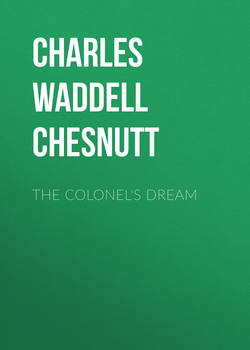Читать книгу The Colonel's Dream - Charles Waddell Chesnutt - Страница 10
Nine
ОглавлениеFurnished with money for his keep, Peter was ordered if again molested to say that he was in the colonel's service. The latter, since his own plans were for the present uncertain, had no very clear idea of what disposition he would ultimately make of the old man, but he meant to provide in some way for his declining years. He also bought Peter a neat suit of clothes at a clothing store, and directed him to present himself at the hotel on the following morning. The interval would give the colonel time to find something for Peter to do, so that he would be able to pay him a wage. To his contract with the county he attached little importance; he had already intended, since their meeting in the cemetery, to provide for Peter in some way, and the legal responsibility was no additional burden. To Peter himself, to whose homeless old age food was more than philosophy, the arrangement seemed entirely satisfactory.
Colonel French's presence in Clarendon had speedily become known to the public. Upon his return to the hotel, after leaving Peter to his own devices for the day, he found several cards in his letter box, left by gentlemen who had called, during his absence, to see him.
The daily mail had also come in, and the colonel sat down in the office to read it. There was a club notice, and several letters that had been readdressed and forwarded, and a long one from Kirby in reference to some detail of the recent transfer. Before he had finished reading these, a gentleman came up and introduced himself. He proved to be one John McLean, an old schoolmate of the colonel, and later a comrade-in-arms, though the colonel would never have recognised a rather natty major in his own regiment in this shabby middle-aged man, whose shoes were run down at the heel, whose linen was doubtful, and spotted with tobacco juice. The major talked about the weather, which was cool for the season; about the Civil War, about politics, and about the Negroes, who were very trifling, the major said. While they were talking upon this latter theme, there was some commotion in the street, in front of the hotel, and looking up they saw that a horse, attached to a loaded wagon, had fallen in the roadway, and having become entangled in the harness, was kicking furiously. Five or six Negroes were trying to quiet the animal, and release him from the shafts, while a dozen white men looked on and made suggestions.
"An illustration," said the major, pointing through the window toward the scene without, "of what we've got to contend with. Six niggers can't get one horse up without twice as many white men to tell them how. That's why the South is behind the No'th. The niggers, in one way or another, take up most of our time and energy. You folks up there have half your work done before we get our'n started."
The horse, pulled this way and that, in obedience to the conflicting advice of the bystanders, only became more and more intricately entangled. He had caught one foot in a manner that threatened, with each frantic jerk, to result in a broken leg, when the colonel, leaving his visitor without ceremony, ran out into the street, leaned down, and with a few well-directed movements, released the threatened limb.
"Now, boys," he said, laying hold of the prostrate animal, "give a hand here."
The Negroes, and, after some slight hesitation, one or two white men, came to the colonel's aid, and in a moment, the horse, trembling and blowing, was raised to its feet. The driver thanked the colonel and the others who had befriended him, and proceeded with his load.
When the flurry of excitement was over, the colonel went back to the hotel and resumed the conversation with his friend. If the new franchise amendment went through, said the major, the Negro would be eliminated from politics, and the people of the South, relieved of the fear of "nigger domination," could give their attention to better things, and their section would move forward along the path of progress by leaps and bounds. Of himself the major said little except that he had been an alternate delegate to the last Democratic National Nominating Convention, and that he expected to run for coroner at the next county election.
"If I can secure the suppo't of Mr. Fetters in the primaries," he said, "my nomination is assured, and a nomination is of co'se equivalent to an election. But I see there are some other gentlemen that would like to talk to you, and I won't take any mo' of yo' time at present."
"Mr. Blake," he said, addressing a gentleman with short side-whiskers who was approaching them, "have you had the pleasure of meeting Colonel French?"
"No, suh," said the stranger, "I shall be glad to have the honour of an introduction at your hands."
